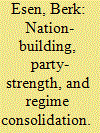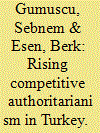|
|
|
Sort Order |
|
|
|
Items / Page
|
|
|
|
|
|
|
| Srl | Item |
| 1 |
ID:
167341


|
|
|
|
|
| Summary/Abstract |
Scholars tend to assume that consolidated democracies are free from the global retreat of democracy due to their strong institutions and economic development. Yet, populist forces that challenge the liberal democratic model have started to increase their support even in Western countries. However, in no country has democratic backsliding taken scholars by more surprise than in the United States. This article addresses the question of how a populist figure like Donald Trump managed to win the presidential election and subsequently undermined the democratic institutions in one of the world’s oldest democracies. We contend that the upsurge of populist leaders in contemporary Western democracies resulted from the political establishment’s failure to juggle responsiveness and responsibility simultaneously. In addition to our discussion of American politics, we draw parallels with the Turkish case to demonstrate our causal argument and offer suggestions on how to reverse democratic backsliding in the United States.
|
|
|
|
|
|
|
|
|
|
|
|
|
|
|
|
| 2 |
ID:
135844


|
|
|
|
|
| Summary/Abstract |
Despite its waning influence, Kemalism remains a compelling topic within scholarship on Turkey. In recent years, for instance, a growing literature has critically examined the policies, arrangements, and institutions that underpinned the Kemalist single-party rule (1923–46). Although they have expanded our stock of knowledge on this period and pushed scholarly exchanges beyond polemical debates, most of these studies neglect to account systematically for the origins of the regime and assess it in light of other similar cases from the global south. To address such questions, this paper classifies Kemalism within a category of national-developmentalist regimes. The Turkish case differed from these cases, however, with its low level of institutionalization, particularly its ruling party's limited organizational and mobilizational capacity. While scholars tend to focus on the coercive aspects of Kemalist rule, in reality the regime was built upon a weak party apparatus, a factor that precluded the consolidation of the regime. This paper attributes such an outcome to two factors that gave Mustafa Kemal few incentives to build strong state and party institutions at the onset of his rule, namely (1) a low level of intra-elite conflict and (2) limited popular mobilization. Due to their limited base of support, the Kemalist leadership remained vulnerable to the defection of elites, who could mobilize the popular classes against the ruling party. This paper situates Kemalism as part of a broader category of reformist regimes in the developing world. In so doing, the paper carves out an analytical space wherein scholars can analyze Kemalism in comparative light and highlight the ways with which the Turkish experience differed from other similar cases in the global south.
|
|
|
|
|
|
|
|
|
|
|
|
|
|
|
|
| 3 |
ID:
177009


|
|
|
|
|
| Summary/Abstract |
With four successful and three failed coups in less than 60 years, the Turkish military is one of the most interventionist armed forces in the global south. Despite this record, few scholars have analyzed systematically how the military’s political role changed over time. To address this gap, this article examines the evolution of civil–military relations (CMR) in Turkey throughout the 1960s and 1970s. Based on a historical analysis, this article offers a revisionist account for the extant Turkish scholarship and also contributes to the broader literature on CMR. It argues that the military’s guardian status was not clearly defined and that the officer corps differed strongly on major political issues throughout the Cold War. This article also demonstrates that the officer corps was divided into opposite ideological factions and political agendas and enjoyed varying levels of political influence due to frequent purges and conjectural changes.
|
|
|
|
|
|
|
|
|
|
|
|
|
|
|
|
| 4 |
ID:
148258


|
|
|
|
|
| Summary/Abstract |
Since the Justice and Development Party (AKP) came to power in 2002 Turkey has undergone double regime transitions. First, tutelary democracy ended; second, a competitive authoritarian regime has risen in its stead. We substantiate this assertion with specific and detailed evidence from 2015 election cycles, as well as from broader trends in Turkish politics. This evidence indeed confirms that elections are no longer fair; civil liberties are being systematically violated; and the playing field is highly skewed in favour of the ruling AKP. The June 2015 election results and their aftermath further confirm that Turkey has evolved into a competitive authoritarian regime.
|
|
|
|
|
|
|
|
|
|
|
|
|
|
|
|
| 5 |
ID:
134772


|
|
|
|
|
| Summary/Abstract |
This article seeks to account for the prolonged inability of the Republican People's Party (Cumhuriyet Halk Partisi, CHP) to be considered as a credible alternative to the governing Justice and Development Party (Adalet ve Kalkınma Partisi, AKP). Accounting for this is relevant from two perspectives: the emergence of a dominant party system during the AKP decade, and the increased rhetoric and public discourse stressing the “lack of [credible] opposition parties” in the party spectrum. The article attributes the CHP's electoral malaise to a mixture structural and leadership problems specific to the party organization. This argument, however, is placed against the backdrop of the dominant distributive position that the incumbent occupies in Turkey's political arena. The AKP's domination of both national and local government, typified by a service-oriented governing style, serves to undermine not just the CHP's chances of success, but virtually all opposition parties.
|
|
|
|
|
|
|
|
|
|
|
|
|
|
|
|
|
|
|
|
|